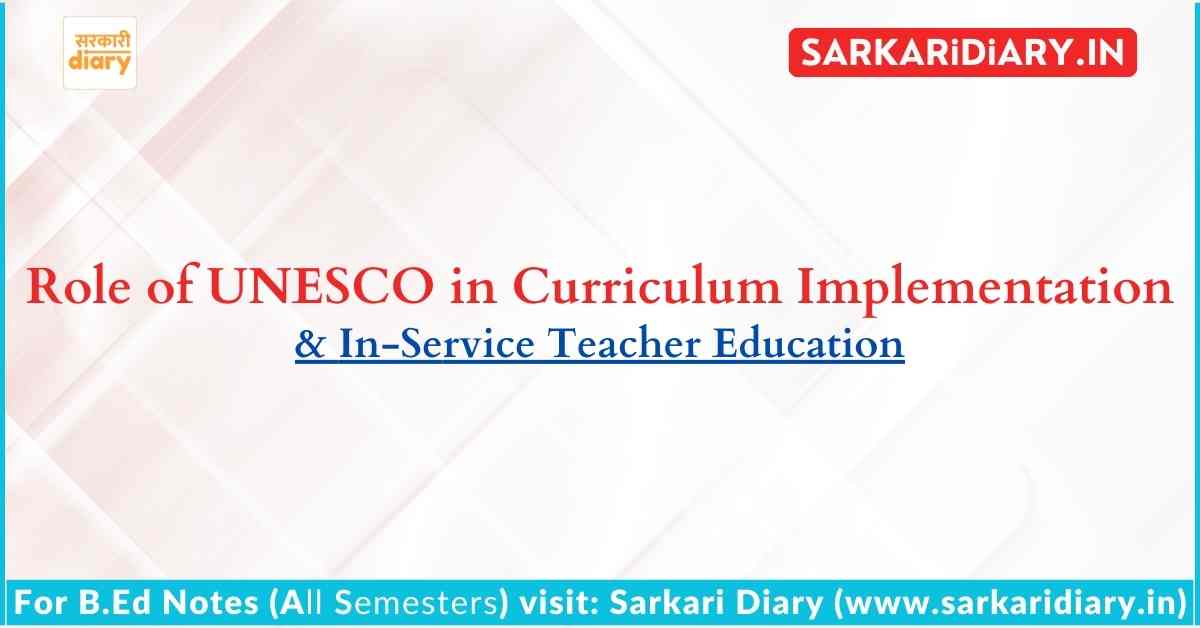Role of UNESCO in Curriculum Implementation and In-Service Teacher Education
“Since wars begin in the minds of men, it is in the minds of men that the defences of peace must be constructed.” — Preamble of UNESCO

Introduction: Why UNESCO Matters in Education
The United Nations Educational, Scientific and Cultural Organization (UNESCO) plays a critical role in promoting international peace and development—not through treaties or economic agreements alone, but through education, culture, and scientific cooperation. Established after World War II, UNESCO aims to build peace where it truly begins: in the minds of people.
One of its most powerful tools? Curriculum reform and teacher education across member countries, including India.
Aims of UNESCO in Curriculum Implementation
| Primary Aim | Explanation |
|---|---|
| Promote international goodwill | Through cultural and educational exchanges that promote understanding. |
| Establish peace through education | By shaping minds to reject conflict and embrace brotherhood and cooperation. |
| Foster cultural and scientific sharing | Ensuring that all nations benefit from global knowledge and creativity. |
UNESCO’s initiatives are grounded in the belief that lasting peace cannot be built solely through political or economic means, but through intellectual and moral solidarity among people.
UNESCO’s Role in Curriculum Development and Implementation
UNESCO supports member nations like India by helping improve educational systems through the following strategies:
✅ Key Functions
| Function | Impact on Curriculum |
|---|---|
| Promotes international understanding through education | Embeds values of peace, cooperation, and tolerance into school curricula |
| Encourages educational research and curriculum development | Funds studies that help nations build relevant, modern, and inclusive syllabi |
| Supports textbook and resource development | Aids translation and distribution of quality learning materials |
| Organizes global teacher exchange programmes | Fosters sharing of teaching strategies and innovations |
| Assists in opening schools in underprivileged areas | Promotes equitable access to education |
| Recommends curriculum reform to suit 21st-century needs | Promotes innovation, sustainability, digital skills, and global citizenship |
Global Programmes with Local Impact
Educational exhibitions on literature, science, and the arts
Cross-cultural student exchange tours
Media campaigns promoting international cooperation through education (via TV, radio, press)
Advisory roles in national curriculum committees
UNESCO also assists with curriculum audits, helping ministries of education revise, update, and adapt teaching materials and practices in line with global standards and local needs.
In-Service Teacher Education: UNESCO’s Emphasis on Lifelong Learning
A key part of curriculum success lies in teachers—the real implementers of educational vision. UNESCO strongly advocates continuous professional development (CPD) for teachers, often referred to as in-service teacher education.
What Is In-Service Teacher Education?
It refers to training received by teachers after joining the profession, ensuring they:
- Stay updated with current subject knowledge
- Improve teaching methodologies
- Enhance classroom interaction and learner engagement
“A teacher can never truly teach unless he is still learning himself.”
— Rabindranath Tagore
Objectives of In-Service Teacher Education
| Objective | Purpose |
|---|---|
| Update content knowledge | Equip teachers with latest developments in their subject areas |
| Encourage self-study and research | Develop habit of lifelong learning |
| Improve pedagogical skills | Promote use of modern, effective teaching techniques |
| Address school/state-specific needs | Design training to match local learning contexts |
| Foster reflective teaching | Encourage continuous self-evaluation and improvement |
Common Programmes and Methods Used
| Programme Type | Description |
|---|---|
| Workshops & Seminars | Hands-on sessions focusing on specific topics or skills |
| Refresher Courses | Regular updates on pedagogy, content, and assessment methods |
| Study Groups | Collaborative learning circles among teachers |
| Symposiums & Conferences | Platforms to share research, ideas, and innovative practices |
| Professional Reading | Journals, reports, and educational literature |
| School-Based Programmes | Training delivered within school or school complex |
Major Indian Agencies Involved
UNESCO supports and collaborates with the following Indian institutions for teacher training:
- NCERT (National Council of Educational Research and Training)
- SCERT (State Council of Educational Research and Training)
- DIETs (District Institutes of Education and Training)
- UGC (University Grants Commission)
- State Universities and Language Institutions
- Teacher Training Colleges and NGOs
Why It Matters: The Teacher as Nation Builder
“Education without a teacher is like a body without a soul.”
Teachers are not only facilitators of knowledge but also shapers of national character and global citizens. In-service education, supported by agencies like UNESCO, ensures that teachers:
- Stay motivated and capable
- Cultivate a global perspective
- Apply best practices to meet the needs of 21st-century learners
Conclusion
UNESCO’s work in curriculum implementation and teacher education reinforces a vital truth: Education is not merely about learning facts, but about building peace, understanding, and global solidarity. Through collaboration with NCERT, SCERTs, and various educational bodies in India, UNESCO helps develop teachers and curricula that can guide future generations toward a more harmonious, knowledgeable, and inclusive world.
Summary Table
| UNESCO Contribution | Impact on Indian Education |
|---|---|
| Curriculum development guidance | Promotes peace education, inclusivity, and 21st-century skills |
| Teacher exchange and training programmes | Enhances teacher quality and global exposure |
| Educational research and funding | Supports innovation and content creation |
| In-service teacher training support | Builds professional capacity at local and national levels |
| Cross-cultural learning initiatives | Encourages global citizenship and inter-cultural understanding |